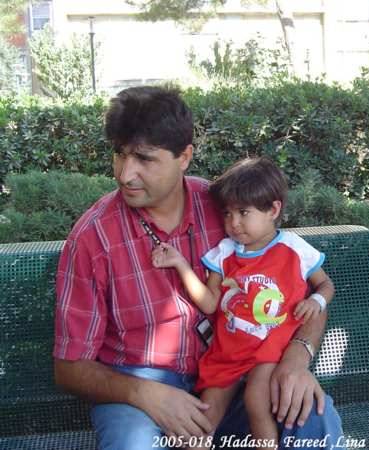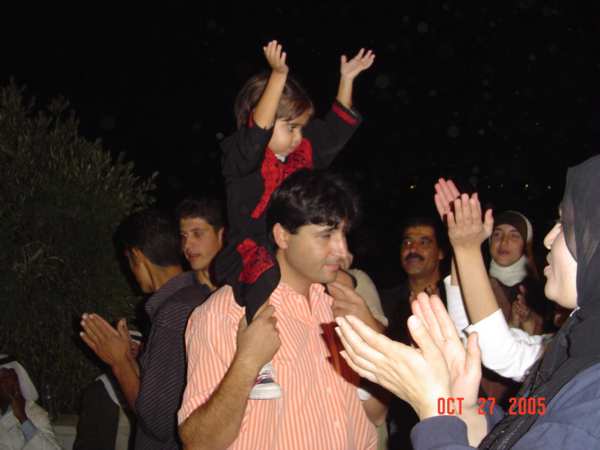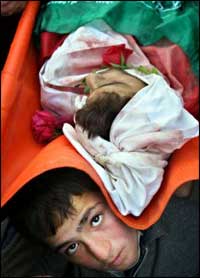
DECEMBER 2005
This will be the final update, baring unforeseen circumstances
A letter from Dorothy Naor
The Upside of the Story
With the car horn blaring out the good news to the small West Bank village of Qira, Lina returned home, a new child, on Thursday, October 27, 2005 at 16:00 (4:00PM).

She had been in the hospital for four weeks and a day—from Wednesday, September 28 till Thursday, October 27. Quite a long haul for a tot. But Lina took it in her stride. Even when told that she was going in for surgery she showed no trepidation while waiting to be wheeled into the
operating room. Of course she was no stranger to hospitals. A good part of her 3 years had been spent in them. But now, hopefully, that part of her life is done, except for follow-up examinations.
The new Lina is a different child from the one that went into the hospital. She previously had been wan and tired, had needed to be carried. Now Lina hops, jumps, skips, and runs happily on her own. Before she lacked appetite. Now she eats varieties of foods with gusto. And whereas she had not gained weight during an entire year, remaining but 12 kilo, with limbs that were as thin as toothpicks, this week, by contrast, she gained ½ a kilo, and is continuing to fill out very nicely. In brief, she has transformed from a very ill child to a normal little girl.
This miracle was wrought by her donor and the doctors who performed the kidney transplant. But thanks is due also to all who helped with funding (including the hospital, which gave a 30% reduction, the Peres Center, which paid a good part of the bill, the PA which chipped in with about ½ the cost, and your donations). Your donations help buy the immensely costly but essential medications, some of which Lina will require for the rest of her life. Your wishes for her health helped keep spirits up.
Lina’s return home was an exciting affair. Villagers poured out of their houses to greet her, and children ran after the car. It was a momentous event for the small community where Lina lives. And indeed so it should have been, for the kidney transplant gave Lina the most important gift of
life.
We arrived in Qira just as the sun was beginning to set. Shortly there would be a ‘hafle’ (a party). It was to be a double celebration: for Lina and for Lina’s donor Anna, and her husband, Mandisi. The two had wed just 2 weeks before Anna came from abroad to donate a kidney to Lina. The hafle was at one and the same time a celebration of Anna and Mandisi’s marriage and of the precious gift of life to Lina.
The party began at sunset with the meal to break the day’s Ramadan fast. Sumptuous varieties of rice dishes, stuffed grape leaves, soups, salads, chicken and meat, ending with Palestinian desserts showed that the women in the family had worked hard and lovingly to produce the delicious repast
The hafle was an outdoor affair, on the patio of Fareed’s (Lina’s dad’s) brother. Most of the 70 or so guests were family. But there were also other Israelis in addition to Israel (my spouse) and myself, and also several friends from other villages, and a few internationals. Fareed and Amina are very warm people, and so also are their extended families. Israel and I felt totally at home, and privileged to have been there for that wonderful exciting occasion, dancing Palestinian dances and enjoying the fun and gaiety till 23:00 (11PM).
Towards the end, I wandered off for a few minutes, into the dark and nearby trees. In the distance the lights of the settlement of Ariel formed a line on the hill. Initially, I did not realize what they were—so remote Ariel seemed from the events that I was participating in. But the realization of
what the lights were brought home the true reality of the situation—the fact of occupation, of settlements, of injustice. The quiet surrounded me, except for the distant sound of music and laughter on the patio. I blinked away the lights of Ariel momentarily and thought, ‘this is what it should be-- lightness and laughter and joy.’
At 2:00 AM, Israel and I left Anna and Mandisi at the airport. They would soon be on a plane for home, Anna feeling stronger and better but not yet 100% well. With their departure, a chapter ended.
When did this chapter begin? None of us clearly remembers. Fareed thinks that he told us about 2 years ago at Deir Balut while we were all waiting for a demonstration to begin against confiscation of the village’s land for construction of the wall. Anna, Fareed, and I first met at the Mas’ha Camp against the wall--the first attempt of an organized non-violent protest against the wall, from March 28, 2003 through August 5, 2003 (you can read about the camp on www.stopthewall.org.il). That now seems a hundred years ago. So much in the West Bank has changed since then, changed for the worse.
The final pages of this chapter began with Anna’s arrival for the surgery, a week before it took place. There were tests to ascertain compatibility between the donor and recipient, and then, following the consent of committees examining the donor to ascertain that her donation was truly a
gift rather than a commercial transaction, the big day came.
We gathered in the ante room near the operating rooms. Anna and Lina were wheeled in. A camera crew that had been working for almost two months on a documentary of Lina’s transplant (the before, the during, the after) was there shooting pictures and recording. We chatted quietly, trying to keep spirits up. Mandisi, Anna’s husband arrived from the airport (having just flown in) as she was being wheeled to surgery; Lina left a few minutes after Anna, accompanied to the operating room by Amina, who remained with her till she fell asleep.
When the principles were wheeled out, those of us left behind broke down. The tension poured out in tears and strong emotions. So very much was at stake.
Long hours passed—5 ½ hours for Anna’s surgery, 7 ½ for Lina’s plus preparation preceding the surgery. A total of over 9 hours passed before the long wait ended.
A few events interspersed with the waiting. Amina’s mother decided to travel the long distance from her house to Hadassah hospital in Jerusalem, despite not having a permit. “How can I not be at my granddaughter’s side,” she said. Two members of Fareed’s family also decided to come. The three were helped by media people who had come to report the event, and who drove to the A Ram checkpoint to pick up the relatives. One of the team managed to convince the soldier to let Amina’s mother in: “What are you going to do,” he said, “send her back without letting her see her granddaughter?”
The same reporters also made certain that no one would be hungry (Ramadan had not yet begun). While we sat there waiting for news, they went and brought meals for all. Finally the nurse came: “Anna was in the recovery room.” Mandisi went to her side. Another two hours and Lina was also in the recovery room. With the news that the surgery had been successful, the emotions poured out again, this time in hugs and kisses. Amina’s mother joyfully passed chocolates to all.
Anna’s recover was not easy. But she was released from the hospital slightly over a week prior to Lina, going with Mandisi to Qira to rest and regain her strength.
Lina had to undergo the scalpel once more before she left the hospital, to remove tubes that had been inserted into her body and to repair a hernia (the 3rd time she’d had it the past year as a result of fluids that had accumulated in her body prior to the transplant).
Amina remained at the hospital throughout the entire period, sleeping by Lina’s side. Fareed was also there for the first two weeks, sleeping on a chair that opens up into a bed. Lina, after being in intensive care for almost a week, was moved to a room where she was the sole occupant, the main
concern being to keep her from infections. Her immune system is very low at present due to medications essential to her survival, and will remain so for at least the next 6 months. This means that should she become ill, even with only a cold, she must be rushed to the hospital, because even a slight illness can be very dangerous for her.

The Down Side of the Story
Amina and Fareed were given permits for most of the period of hospitalization. On October 24th the permits ran out. Amina’s has been renewed, but only for 3 times, each time for 5 days. Fareed’s permit was initially not renewed. He therefore was prohibited from coming to the hospital most of the final week. During Lina’s former hospitalizations, he managed to get to the hospital without a permit, but that was in East Jerusalem. There they do not check permits at the entrance to the hospital. At Hadassah hospital they do. So even had he managed to get to the hospital, he could not have gotten in. As it was, on one occasion when his permit was still valid, and he had gone outside, the security guard refused him entrance, and only after several phone calls was Fareed allowed to re-enter the building. Fareed’s permit has once again been renewed, finally, this time for 20 days.
In a sense he and Amina are lucky. They have for the most part had permits. This would seem in good part to be due to the excellent relationship of the coordinator at the hospital with the person responsible for issuing the permits.
But is anyone lucky who needs permission from authorities to be with or to visit one’s child at a hospital? Is anyone lucky who has to depend on good the good will of others to be with one’s child when it is ill. Yet, this is a reality that Palestinians live with. Their right to movement does not
exist. They have no freedom. They instead have to depend on the goodness of the heart and whims of the General Security Service and individual soldiers or police and their commanders. And even when permits are issued to family, this does not allow them to drive. They must depend on public transportation, and on getting through checkpoints. If Lina should need to get to Hadassah hospital urgently, it is not at all certain that she will be able to. In fact it is more likely that she will not be able to. So please keep your fingers and toes crossed that she never has to face that emergency.
Nor do letters from the hospital necessarily help. Anna was given a letter in Hebrew from the doctor, on paper with the Hadassah hospital letterhead, advising the General Security Service (shabak) and anyone else that needed to be advised that she had donated a kidney to save the life of a child, was still weak, and should be treated with care and gentleness. That did not help. The GSS harassed her at the airport, notwithstanding the letter.
And what about Lina. Her present health gives hope for a rosy future, so far as concerns health. But even should there never be an emergency, even if her health will remain stable, that does not guarantee her a bright future. Like any Palestinian child’s future, Lina’s is terribly uncertain. Will Israeli government policy and the military permit her to grow into a happy healthy and productive adult, as she deserves? For this to happen, Lina needs not only her health, but also an end to occupation. Please help all you can.
Thanks,
Dorothy
PS. Despite long and numerous hours of work, the documentary will never be seen. Unfortunately, the video cassettes were stolen along with cameras and other equipment from the director's apartment.

Six Israelis receive organs of Jenin
boy shot in error by IDF
By Amos
Harel and Arnon Regular, Haaretz Correspondent
November 9th 2005

The vital organs of a Palestinian boy mistakenly killed
by the Israel Defense Forces last week have been
transplanted into the bodies of six Israelis, after the
boy's family donated his organs "for the sake of
peace between peoples," Israel Radio reported.
Ahmed al-Khatib, 12, was fatally shot during clashes in
Jenin last week, when IDF troops mistook the toy gun he
carried for a real rifle.
Three Israeli girls, two Jewish and one Druze, underwent
surgery Sunday to receive Al-Khatib's lungs, heart and
liver. Twelve-year-old Samah Gadban had been waiting for
a heart for five years when doctors called her family
late Saturday and told them of the Al-Khatib donation. By
Sunday afternoon, the Druze girl had a new heart and was
recovering at Schneider Children's Medical Center in
Petah Tikvah.
"This morning, I did not know anything about the
boy. I only knew that the doctors said they had a
heart," said Samah's father, Riad. "I don't
know what to say. It is such a gesture of love ... I
would like for [the family] to think that my daughter is
their daughter."
Jamal al-Khatib said he hoped to meet the recipients of
his son's organs to ensure that they were healthy, and
added: "The most important thing is that I see the
person who received the organs, to see him alive."
The boy's liver was divided in two and given to a
6-month-old baby and a 56-year-old woman; his kidneys
were given to a 5-year-old boy; and his lungs were given
to a 5-year-old boy and a 4-year-old girl, the radio
said.
Dr. Tzvi Ben-Yishai, spokesman for Rambam Medical Center
in Haifa, where Al-Khatib had been treated, said the
boy's parents decided to donate his organs "to bring
hearts closer and bring peace closer."
"I don't mind seeing the organs in an Israeli or a
Palestinian. In our religion, God allows us to give
organs to another person and it doesn't matter who the
person is," said Jamal al-Khatib, the boy's father,
who added that he hoped the donations would send a
message of peace to Israelis and Palestinians.
"I had an older brother who suffered from kidney
failure," he told Channel 2, "and there were no
transplants available. When the doctor told me that my
boy was clinically dead, I remembered my brother."
The incident involving Ahmed occurred when soldiers
entered Jenin Thursday as part of an ongoing operation to
arrest Islamic Jihad operatives. Shots were fired at the
soldiers and teenagers threw rocks at their Jeeps.
The soldiers thought they saw an armed man some 130
meters away, and one of them fired, hitting the suspect
in the head. When the soldiers approached, they found
Ahmed laying critically injured - with a toy gun. The IDF
subsequently circulated photos of the gun to show how
realistic it looked.
He was taken to the hospital in Ramallah, but later
transferred to Haifa. He died late Saturday and his
parents quickly agreed to donate his organs.
Palestinian sources said Al-Khatib was apparently not one
of the boys who had been throwing rocks at the soldiers.